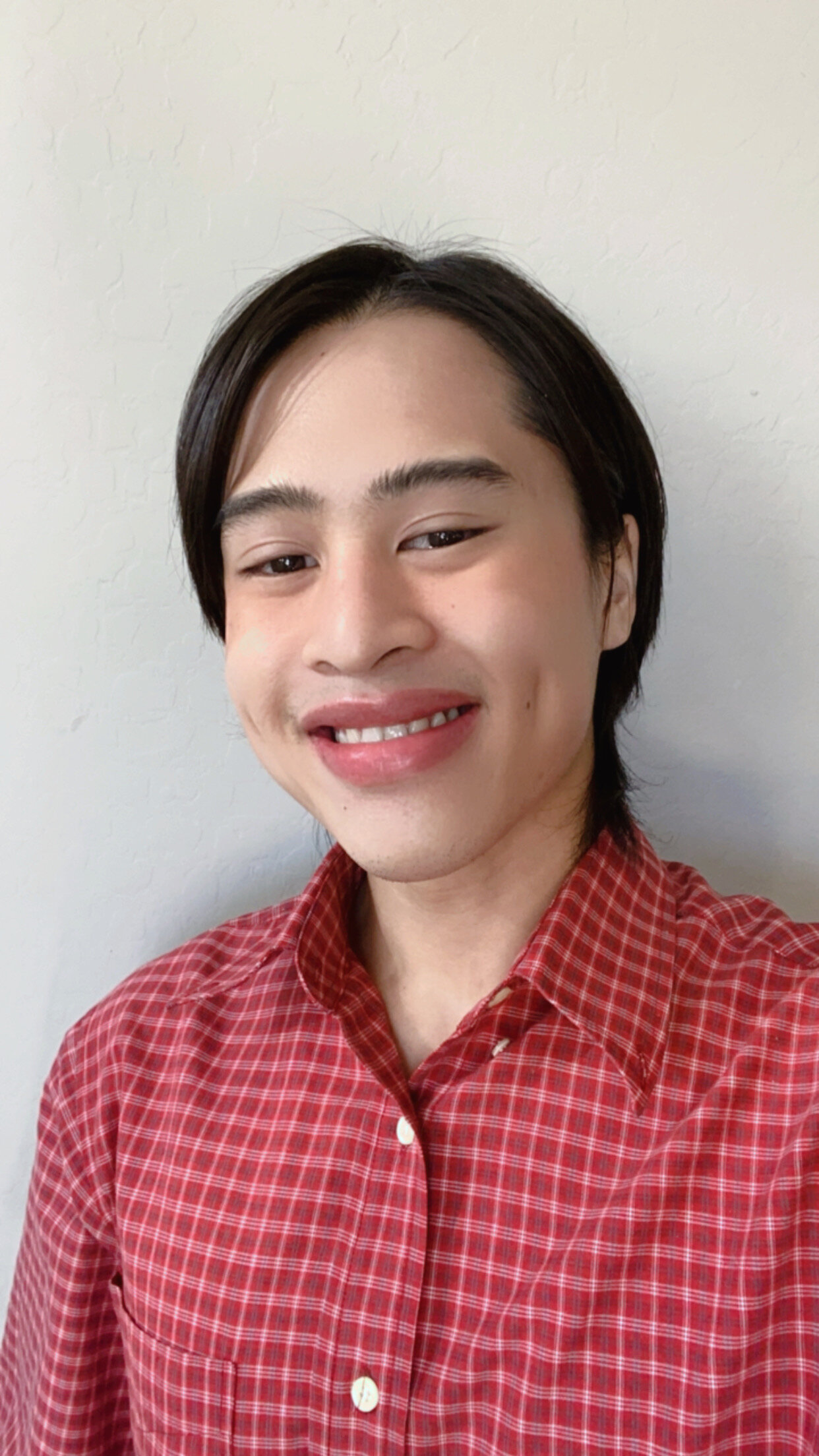Apple Pie
By Aaron Talledo
On the second floor of my fourth childhood home, behind the cream sectional and squeezed between two windows, is a wall of portraits. Ranging from standard 8" x 10" 's locked within ornate wooden frames to monstrous canvas prints depicting first-time vacations, each picture holds a story. They are an archive of memories detailing my family's journey as we navigate the nuances of American life.
At the wall's center, within a small lattice-patterned frame, is a picture of my family. We're apple picking in Ohio. It is September as grey-bellied clouds and a sunless sky hover over groves of modest apple trees. Golden Delicious and Honeycrisps vein along sturdy ashen branches like Christmas ornaments. Some have fallen to the ground. Their shine and vitality now thinned by smudges of dirt and the look of rot settling in.
Dad stands behind me. Two years in the U.S. has caused his skin to lose its luster, a deep brown now paled to a tawny beige. The waffle-knit thermal fits comfortably upon his broad shoulders. His smile is unparalleled. It is a beaconing crescent against the dreary day.
Ma abhors the cold weather and misses the tropical embrace of Davao City. She is in a wool turtleneck and raincoat. It's three sizes too big, swallowing her in white nylon. Her eyes are aged, yet gentle and inviting, a pair of warm honey pots—the type of eyes a mother should have. But the smile is artificial. She's gripping Dad's hand and folding her lips, construing her face as a frigid gust slaps her cheeks raw. It was Ma's idea to visit the orchard. Apple pie enamored her, and she sought to make her own. The flavor and design itself weren't particularly intriguing, but the concept, what it meant, and symbolized to a young immigrant girl eager to leave her home country, meant everything. Years spent acquiring the proper paperwork and documentation led to this very moment. Finality towards Americanization awaited not in a certificate authenticated by the U.S. government, but in the form of gooey apple filling encased within a tin dish, blanketed by a flaky crust.
Aiah, my sister, who is three years my junior, is small and delicate like a doll. Her long black hair defies natural laws, resting neatly on her shoulders, unaffected by the wind. She wears a matching denim set of jacket and jeans, each embroidered with pink gerbera daisies and yellow spirals. She glares at the apple in her hand, deciding whether or not it's pie material.
I'm waving at the camera, and there's an awkwardness to my face—my mouth is agape, and my eyes are squinted. I don a loose-fit navy hoodie and Levi shorts indicative of the early 2000's—too long and very ugly. As a plucky five-year-old, I am fond of Spongebob Squarepants, dinosaurs, and airplanes. I tell Ma that I'll be a pilot one day. She encourages this short-lived dream by gifting me model Boeings and my very own pilot's cap, my name stitched in gold font at the back.
Paper bags in hand, we comb through the orchard. I chart the path forward as untamed grass pricks my ankles. The leaves have ombréd. Dazzling shades of burnt orange and gold whistle past me as the wind quickens. I eye each apple carefully, ensuring no soft or brown spots. They smell clean and sweet, floral notes swirling in my nose. The showers come. First, a sprinkle, but torrents ensue, signaling the end of our harvest. The bounty is plentiful enough to make not one but two pies.
With my head against the window, I watch myself bounce past cornfields and cows in pasture as thick drops slide across our minivan's glass. Ma blasts the heater, and the warmth envelopes me. The rain's ticks are a lullaby, weighing my eyelids and ushering me to sleep.
…
The apartment is cramped yet cozy. It is our first American home, with the most basic of creature comforts. The light flickers on, its pathetic glow casting an ugly yellow against the walls. Our footsteps echo on the wooden floor. The grain is worn and faded, with only small sections retaining a maple sheen. Speckles of dust aimlessly float as the first rays of sunlight peek through the blinds. Aiah is asleep in Dad's arms. Her head is slumped, tussles of black hair draped across her face. She coos as they go into the bedroom to nap.
I follow Ma into the kitchen. She frees herself from the raincoat and pulls her hair back with the tie around her left wrist. She chooses my bag of apples, pouring them over the countertop. I treat it like a game, extending my arms against the counter, making sure none fall to the linoleum.
Watching Ma bake is bewildering. The chaos of fallen flour and the sound of rhythmic chops excite me. In a frenzy, cubed apples tower the cutting board, sweet syrup boils, and dough rolls to a fine thickness. I sit eagerly at the dining table as Ma carefully assembles each piece. With a metallic clang, she slides the pie into the oven, wiping her forehead with a rag. Ma makes me a bowl of leftover filling while we wait for the pie to bake. I delight in the treat, licking the sweet from my fingers.
By now, Dad, carrying Aiah, walks into the kitchen. Aiah's rubbing her eyes in delirium. He plops into a chair, transitioning her to his lap. I push my bowl towards Dad, letting him spoon some syrup. He smiles and winks his dimples at Ma. "Masarap ito—this is very good, Miss D," he exclaims. Miss D was Dad's nickname for Ma. Her maiden name is Damo, so the initial was apt.
They'd met while working in Saudi Arabia, Ma as a nurse, and Dad as a computer technician. After a few dates and an eventual proposal, they found themselves back in the Philippines, getting married and eventually having me. The decision to immigrate to the States took more than their money. It meant uprooting all they knew about the language they spoke, the culture around them, the people they loved, and the food they ate. The emotional toll it took upon my parents pained them. Schisms, caused by their decision, led to unresolved angst and frustration between their own parents. "Why raise your son there when everything is here," my lola Cora would tell my mother.
Ma smiles back as her and Dad reach and embrace each other's hands. The oven dings, and it's not long before caramel-colored filling oozes from a golden lattice crust as the smell of cinnamon and sugar maze through our home. Using a knife, Ma divides the pie into perfect triangles. She takes three slices, placing each one on white saucers. I devour what seems like endless globs till I'm tuckered on the couch, the memory of today cementing itself into the grooves of my brain.
…
When I start school, a classmate asks me, "Where are you from?"
"The Philippines. I'm Filipino," I say. But as I have gotten older, this question has lost its simplicity and my answer has degenerated.
"Where are you from?"
"Umm, the Philippines, but my parents are the ones that immigrated here. I don't even remember anything about being born there."
"Where are you from?"
"Oh, here from Vegas. Yeah, I've grown up in Vegas all my life."
"Where are you from?"
"Here, from America. Why'd you ask? Does it sound like I have an accent or something?"
I yearn to reclaim that naivety that ruled my childhood, where identity chocked itself up to the color of my skin and the features on my face. I am Filipino, but I am a fraud. My knowledge of the customs of my people is sparse, bordering nonexistent. When I try to speak our language, I sound more like a person making a racist impression. And when Ma makes traditional food, I can only stand the ones that aren't "too smelly" or taste "too weird." When my friends would come over, and Ma couldn't decide what to feed us, I'd tell her to "make something normal, make something like apple pie."
…
When I ask Ma why her and Dad came to America, she gives me that ubiquitous answer so often given by immigrant parents, "For you. We wanted you and your sister to have a better life." What she doesn't tell me is her longing to see the Philippines again—to hug her mother, to sink her toes in the sands of the beach by her childhood home, to pick fresh papayas ripened by a tropical sun, to make up for all that could've been. Ma's eyes well up, ready to burst and flood the room with her tears, but she's strong—she has to be strong, and holds it in.
I do not regret the opportunities brought upon from my parents' immigration and our assimilation into America; to say so is a betrayal to my parents, an affront to the hardest decision they've ever made. But I cannot deny as though a part of me has been lost, cast out and wiped away to some dark corner that will never see the light. I am not ashamed of my culture, nor do I reject it, but to consider myself Filipino when the experience is lacking, tears at me. I struggle to reconcile what I've come to know as a fulfilling life in America with all that has been lost. Still, I find myself constantly returning to the fond memory of Ma baking apple pie.
Since that day at the orchard, Ma's been tinkering with her recipe, experimenting with different varieties, adding more cinnamon here and there, and designing intricately crafted crusts, even making a not so successful one made of chocolate at one point. It's become the star of every potluck, always finding its way on the buffet table of baby showers, birthdays, or funerals. I wonder to myself if my family's two cultures can coexist without anything being lost, and then I look to the buffet table. Amongst generous helpings of pork adobo, crispy pata, or pancit palabok, apple pie sits graciously amongst them as a hallmark of my family's integration into a life oozing in red, white, and blue.
About the piece: The piece is a retelling and rumination of a memory from my past. It is a moment that encapsulates my feelings of family and identity as a Filipino-American.
Aaron Talledo
Always fond of reading and writing, Aaron Talledo is pursuing his literary passions as an English major at UNLV. Aaron is interested in topics relating to video games, movies, and journalism. His affinity for writing and love for the community around him has translated into his current role as a Content Writer for the Love Yourself Foundation, a non-profit organization in the Las Vegas area. He believes that using digital platforms to spread the arts is foundational to creating a welcoming environment for upcoming creatives. Aaron enjoys teaching his dog new tricks, hiking, and spending time with friends during his free time.

